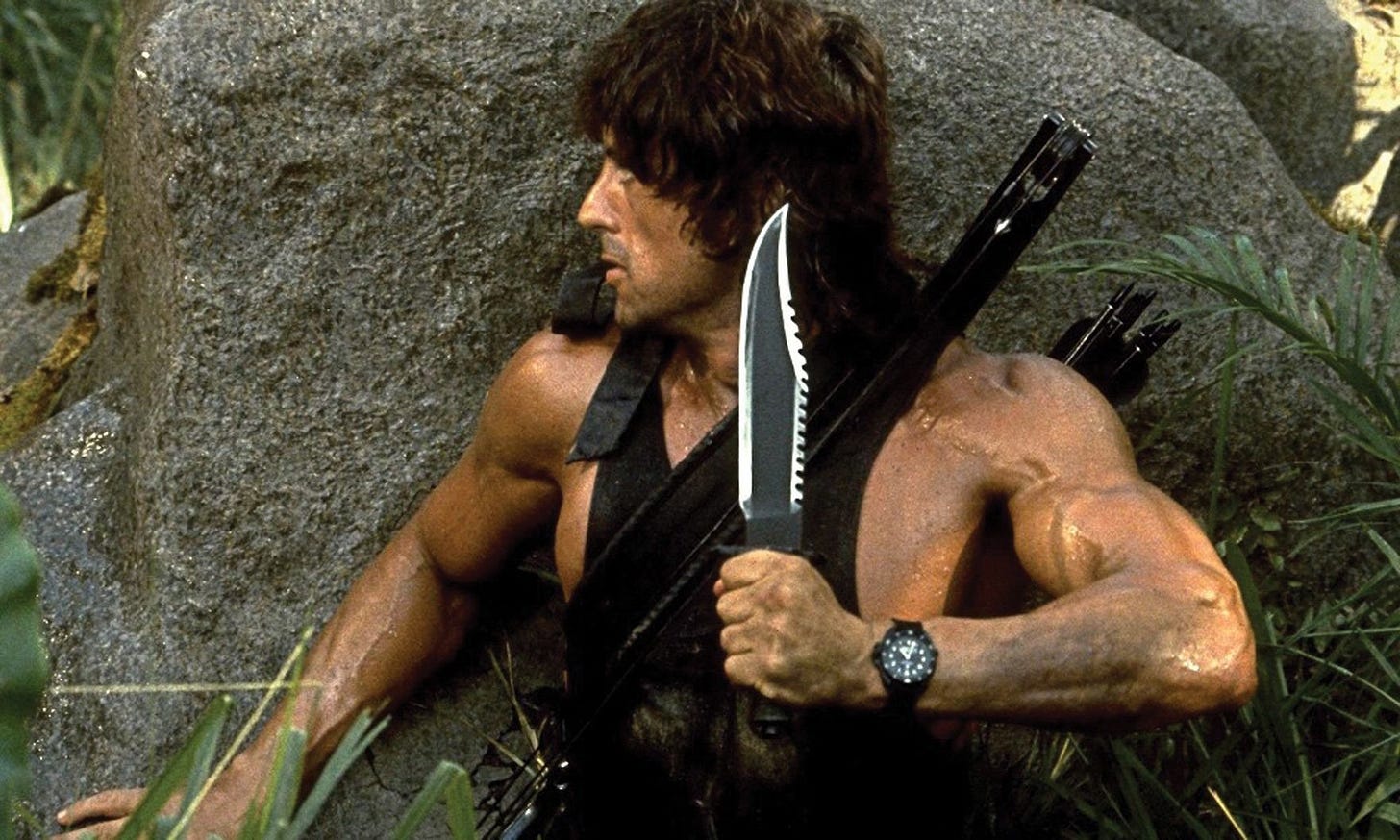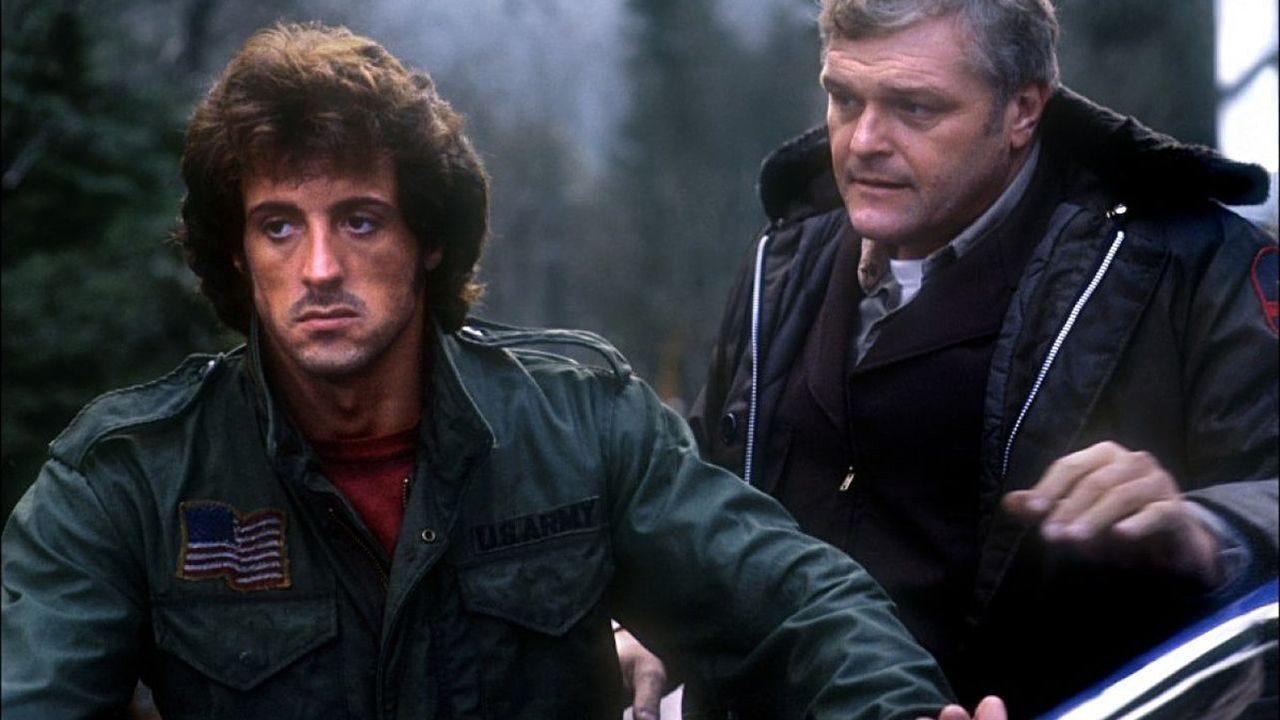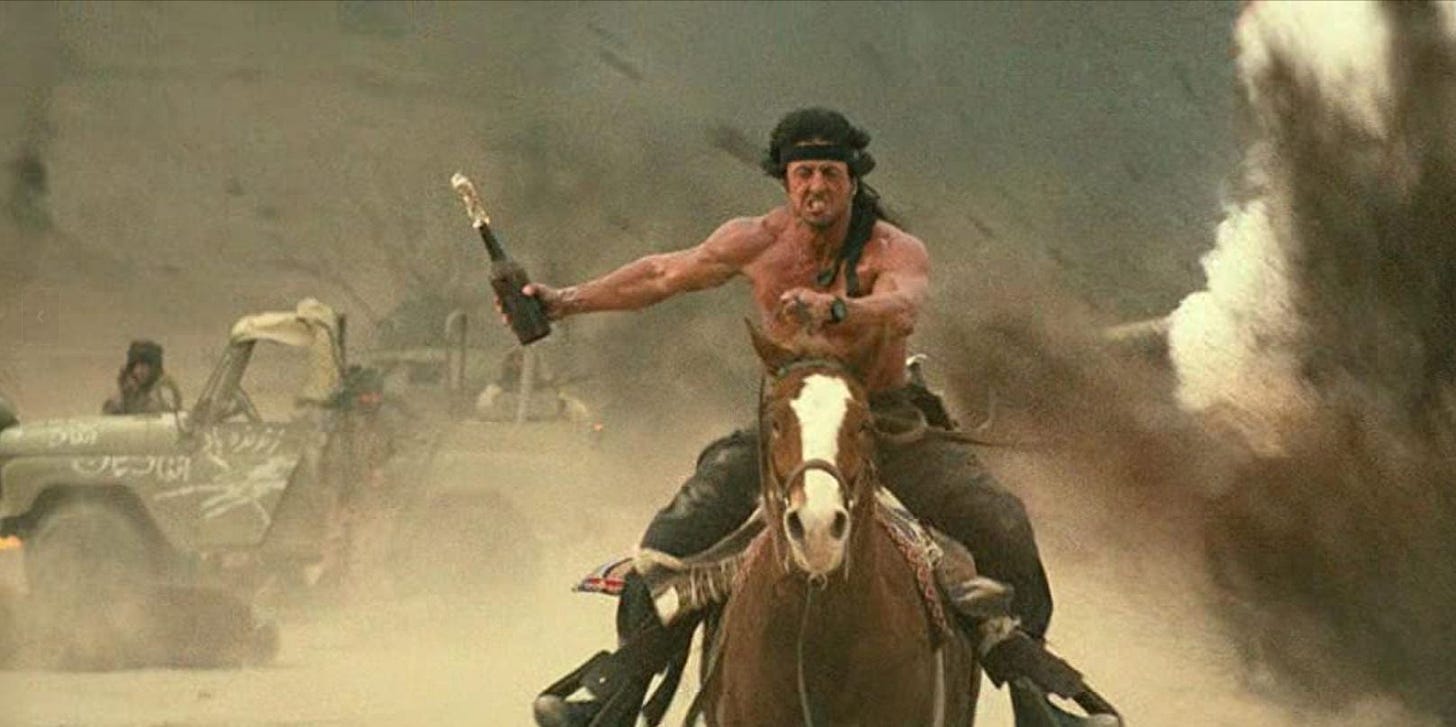I Alone Can Fix It: The Franchise
How John Rambo encapsulates the bleak, dimwitted political movement now in power
Near the end of Rambo: First Blood Part II, Sylvester Stallone angrily jams his signature survival knife in to a desk. He glares at a Washington bureaucrat who, in his estimation, has not done enough to rescue forgotten prisoners of war in Vietnam and growls two words.
“Mission accomplished,” he says.
What he really means, of course, is thanks for nothing. Stallone’s John Rambo has just done the job that this wimpy civil servant across from him was too cowardly to do himself, or even help with doing. It’s a moment of righteous anger that, taken on its face, makes total sense. The state powers that are supposed to be on his side have been worse than useless. Not only have they failed his comrades in the field, they’ve also stood in the way of what it will take to undo their failure. Where would anyone be without John Rambo?
Less than 20 years after Rambo spiked his knife in to that table and declared that the job was done, President George W. Bush stood aboard the deck of the aircraft carrier U.S.S. Abraham Lincoln in front of a sign that parroted Stallone’s declaration exactly. Bush wasn’t angry, though. He was triumphant. This was his moment to declare victory in Iraq. Two years after 9/11, America could claim a victory of sorts in the Middle East, never mind that the architect of that attack was still quite alive many countries away and that a hard and horrifying road lay ahead.
The problem for Bush, and for the rest of us really, is that the credits didn’t roll after that moment. John Rambo has the luxury of quite literally walking away from all the destruction left in his wake. He doesn’t have to try and help rebuild a nation or repair any relationships. He doesn’t even have to sweep up a shell casing. Because of his military service and the skills he picked up in the special forces, he apparently has carte blanche to move fast and break things. So he does, and we catch up with him years later. The movies never show the aftermath, and so there is never any accountability for Rambo. That would be untidy, which is precisely what real life is.
So while Rambo walked away - on to a Buddhist monastery and eventually his next mission - the soldiers Bush sent to Iraq, along with all the people living there and in the surrounding region, were not so lucky. They presided over a descent in to insurgency and sectarian violence that is still roiling that country today. It turns out that ignoring the concerns of bureaucrats to undertake something that just feels good and right in the moment is a fast track to calamity, destruction, and death.
Of course, John Rambo doesn’t craft or execute foreign policy. He’s a tool at the disposal of the United States military. Any mission he undertakes is narrow, tactical and, because of his training, necessarily violent. He is a blunt instrument, and sometimes that’s what the world needs. But this gets to be a very dangerous place when political leaders adopt the mentality of such a blunt instrument.
Unfortunately, the Rambo mentality is as pervasive as its ever been among the right-wing political class. If the world feels as dangerous as its ever been, it is because so many in power fancy themselves as Rambo-like figures.
Consider for a moment a few additional ways the Rambo story echoes to the present moment.
Start with the origin story. John Rambo is, first and foremost, a victim. Unlike the fantastical, fabricated victims of the modern day right wing - from the bakers “forced” to make a cake for a gay wedding to the victim-in-chief whining any time he is held accountable for anything - he comes by it honestly. Our government has continually failed veterans - Donald Trump famously said the quiet part out loud by referring to fallen soldiers as “suckers” - and that is the jumping off point for First Blood.
Indeed, those failures are why Rambo ends up in a small Oregon town in the first place looking for his last living friend, and it’s why he is harassed by local law enforcement so severely that he ends up embracing vigilantism. It’s depressingly ironic, isn’t it, that Rambo’s victimhood leads to violence against the police just as Donald Trump’s victimhood led to violence against the police on January 6th? The permission structure seems to exist, regardless of the fact that Rambo is actually treated unfairly by the authorities whereas Trump is simply so incapable of accepting any sort of unfavorable outcome that he will embrace and promote mass delusion.
Rambo and Trump are also both emblematic of zero-sum thinking and a complete inability to grapple with humiliation and failure. In Rambo: First Blood Part II, Stallone asks his old special forces Colonel, Trautman, “do we get to win this time?”
Has there ever been a more pathetic, selfish line written in the history of film? Rambo, like Trump, is unapologetic about what he has done and is about to do, and there is a disturbingly large percentage of the population that seems to view that as a positive trait. There’s no introspection about our involvement in Vietnam - about the agency of the people of that country or the abject failures and betrayal of our own leaders during the conflict - there is only a crude, unquestioning loyalty to the mission that lies ahead. There is certainly never any chance that Rambo will consider the possibility that he might be part of the problem.
And so it is with the American right: Trumpism as a movement is at its core about never having to feel a shred of remorse for anything you’ve ever done or will do. Indeed, regret, reconsideration of your past actions, any sort of self-doubt is just weakness. And weakness is for the bureaucrats in the way - you know, the ones capable of considering a range of outcomes.
The Rambo movies are ultimately an immature sort of reckoning with our failures of the last half-century. First Blood has a very keen eye for the personal toll those failures have exacted, and is far and away the best of the three films. But the following two seem to conclude that, in the case of Rambo: First Blood Part II, even our failures can be erased with a do-over if we just find the right man, and that, in the case of Rambo III, sticking with that guy can solve literally any geopolitical situation.
They are, of course, spectacularly wrong in their convictions, and that is because for a reckoning to rise above its most puerile form - for it to actually be a reckoning - you have to gaze down both directions of that two-way street.
Rambo III takes John Rambo to Soviet-occupied Afghanistan, where he teams up with the literal Mujahideen (a.k.a. the precursor to al-Qaeda and ISIS) to rescue Col. Trautman from prison and take down a sadistic Soviet commander. The film is dedicated to - no joke - “the gallant people of Afghanistan” and a painfully 1980s cover of “He Ain’t Heavy, He’s My Brother” blares over the closing credits.
In a better version of this world, this is the type of thing that would forever discredit both this film series and the John Rambo-like mentality that lends itself to the most harmful kind of magical thinking.
Unfortunately, we have this world, and a lot of people in it who seem to think that one man - a lone wolf - can fix not just our problems but those of the entire world. All we’ve lived through over the past two decades doesn’t seem to be enough evidence to marginalize this kind of worldview. That’s probably because that would require those who share it to consider any piece of information that is inconvenient. One wonders what it will take for the fever to finally break.





